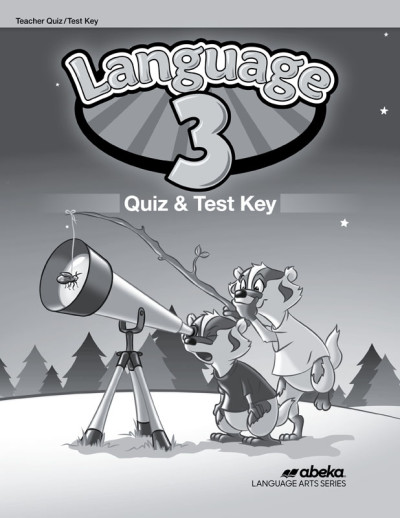We use cookies to make your experience better. To comply with the new e-Privacy directive, we need to ask for your consent to set the cookies. Learn more.
Language Arts 3 Quizzes/Tests Key (5th Edition)
Assessment is a vital part of learning. Evaluate your third grader's language skill as he learns the different parts of speech, word usage, sentence structure, punctuation rules, etc. This answer key includes a copy of your student's tests and quizzes with all of the answers written in. Also included are grading instructions with point values. With all the help given, scoring your student's Language 3 Tests and quizzes (sold separately) can be easy for you.
Language arts programs listed in this section cover most areas of language arts (reading/literature, writing, grammar, spelling and handwriting) in one curriculum, although some skill areas may be covered with less intensity than a focused, stand-alone course.
The Abeka® distinctives start very early and flow through all levels, such as a cursive-first handwriting approach (starts in K and reviewed up to 6), thorough grammar (with diagramming), foundation-based composition skills (begins in 1st grade) and listening/speaking skills (including reading aloud and poetry memorization). All with Christian, patriotic-focused content in a spiral format with detailed teacher instruction. In 1st grade, skills introduced in previous years (phonics/reading, optional cursive, poetry, and vocabulary skills) are enriched with creative writing and sentence-level mechanics, weekly spelling tests, and oral reading. In Grade 2, transition to reading comprehension and beginning literature analysis occurs. Grade 3 begins the four-pronged emphasis of reading skills (analysis & discussion), writing (academic & creative), spelling/poetry, and grammar. Grade 4 (Level A) adds speed reading, the writing process, researching, and diagramming. Students refine all skills in Grade 5 (B), aiming for varied reading and writing (emphasizing research skills), as they head for Grade 6 (C), which cements the elementary skills in preparation for Abeka® upper-level courses.
Abeka® Language Arts Grade 3 begins the four-pronged emphasis of reading skills (analysis & discussion), writing (academic & creative), spelling/poetry, and grammar. A complete Language Arts program requires both a Child and a Parent Kit. Child Kits contain the texts, readers, and all essential materials. Parent Kits include full lesson plans, answer keys, and level-based required materials. Additional lesson plans, student consumables, and reinforcement/enrichment ELA items are available on the Rainbow Resource website.
| Product Format: | Paperback |
|---|---|
| Brand: | A Beka Book |
| Grade: | 3 |
| Length in Inches: | 11 |
| Width in Inches: | 8.5 |
| Height in Inches: | 0.25 |
| Weight in Pounds: | 0.45 |

